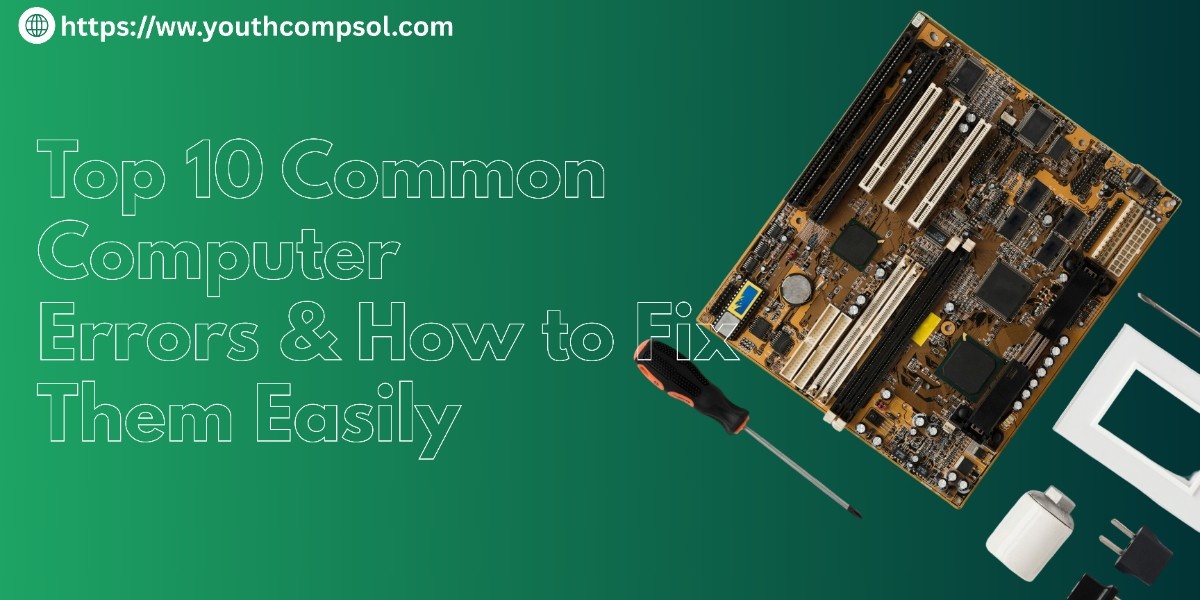
Computers are an essential part of our daily lives, but they aren’t perfect. From slow performance to blue screen errors, we all encounter issues that can be frustrating. The good news? Most common computer problems have simple solutions!
In this guide, we’ll go over 10 of the most common computer errors and how you can fix them easily at home.
1️⃣ Slow Computer Performance
🔍 Why It Happens:
-
Too many background programs running.
-
Low RAM or full storage.
-
Outdated software or drivers.
⚡ How to Fix It:
✔ Close unnecessary programs using Task Manager (Ctrl + Shift + Esc).
✔ Free up space by deleting temporary files (Win + R → type "temp" → Delete all files).
✔ Upgrade RAM or SSD for better performance.
✔ Disable startup apps (Task Manager → "Startup" tab → Disable unnecessary apps).
2️⃣ Blue Screen of Death (BSOD)
🔍 Why It Happens:
-
Faulty drivers or hardware issues.
-
Corrupt system files.
-
Overheating or power supply issues.
⚡ How to Fix It:
✔ Restart your computer and check for updates (Settings → Windows Update).
✔ Run "chkdsk" and "sfc /scannow" in Command Prompt to repair corrupted files.
✔ Update or reinstall drivers from Device Manager.
✔ Check hardware (RAM, hard drive, power supply) for failures.
3️⃣ WiFi Not Connecting
🔍 Why It Happens:
-
Incorrect network settings.
-
Router issues or weak signals.
-
Outdated network drivers.
⚡ How to Fix It:
✔ Restart your router and computer.
✔ Forget and reconnect to the WiFi network (Settings → Network & Internet → WiFi).
✔ Update your WiFi drivers (Device Manager → Network Adapters → Update Driver).
✔ Run Windows Troubleshooter (Settings → Network & Internet → Troubleshoot).
4️⃣ USB Device Not Recognized
🔍 Why It Happens:
-
Faulty USB port or cable.
-
Corrupt USB drivers.
-
Power supply issues.
⚡ How to Fix It:
✔ Try plugging the USB device into a different port.
✔ Restart your PC and reconnect the device.
✔ Update USB drivers (Device Manager → Universal Serial Bus controllers → Update Driver).
✔ Disable "USB Selective Suspend" (Control Panel → Power Options → Advanced Settings).
5️⃣ Laptop Overheating
🔍 Why It Happens:
-
Blocked air vents or dust buildup.
-
Heavy CPU/GPU usage.
-
Faulty cooling fan.
⚡ How to Fix It:
✔ Clean the air vents and fan with compressed air.
✔ Use a cooling pad to improve airflow.
✔ Reduce CPU usage (Task Manager → End unnecessary processes).
✔ Check and replace the thermal paste if needed.
6️⃣ Laptop Battery Draining Fast
🔍 Why It Happens:
-
Too many background apps running.
-
Battery health degradation.
-
High brightness & power-hungry settings.
⚡ How to Fix It:
✔ Lower brightness and enable battery saver mode.
✔ Close unused apps and disable startup programs.
✔ Calibrate the battery by fully charging and then draining it completely.
✔ Replace the battery if it's old (usually lasts 2-3 years).
7️⃣ Keyboard Not Responding
🔍 Why It Happens:
-
Software glitches or outdated drivers.
-
Dirt or liquid damage.
-
Physical damage to the keyboard.
⚡ How to Fix It:
✔ Restart your laptop or PC and check if the keyboard starts working.
✔ Use an external keyboard to test if it’s a hardware issue.
✔ Update or reinstall keyboard drivers (Device Manager → Keyboards → Update Driver).
✔ Clean the keyboard and check for stuck keys.
8️⃣ No Sound from Speakers
🔍 Why It Happens:
-
Muted or incorrect audio settings.
-
Outdated audio drivers.
-
Faulty speakers or headphone jack.
⚡ How to Fix It:
✔ Check if the sound is muted or set to the wrong device (Sound Settings → Output).
✔ Restart the audio service (Win + R → type "services.msc" → Restart "Windows Audio" service).
✔ Update audio drivers (Device Manager → Sound, video & game controllers → Update Driver).
✔ Try connecting headphones or external speakers to check if the issue is with internal speakers.
9️⃣ Computer Freezing or Not Responding
🔍 Why It Happens:
-
Too many applications running.
-
Corrupt system files.
-
Hardware overheating or failing.
⚡ How to Fix It:
✔ Press Ctrl + Alt + Del and open Task Manager to close unresponsive apps.
✔ Restart your computer and check for updates.
✔ Run "sfc /scannow" in Command Prompt to fix corrupted files.
✔ Check for overheating issues and clean the laptop vents.
🔟 Software Crashing or Not Opening
🔍 Why It Happens:
-
Incompatible or outdated software.
-
Corrupt installation files.
-
Conflict with other programs.
⚡ How to Fix It:
✔ Update the software to the latest version.
✔ Reinstall the program if it’s corrupted.
✔ Run the program in compatibility mode (Right-click → Properties → Compatibility).
✔ Check for Windows updates that might fix compatibility issues.